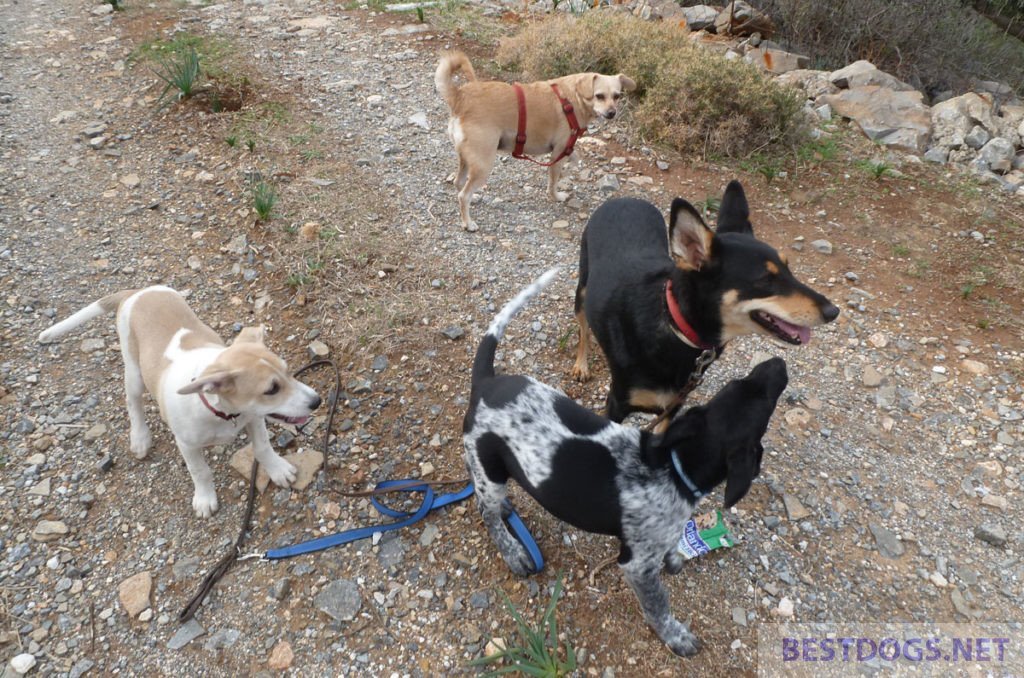Cretan Hound: Unveiling the Heritage of Greece’s Ancient Hunting Breed.
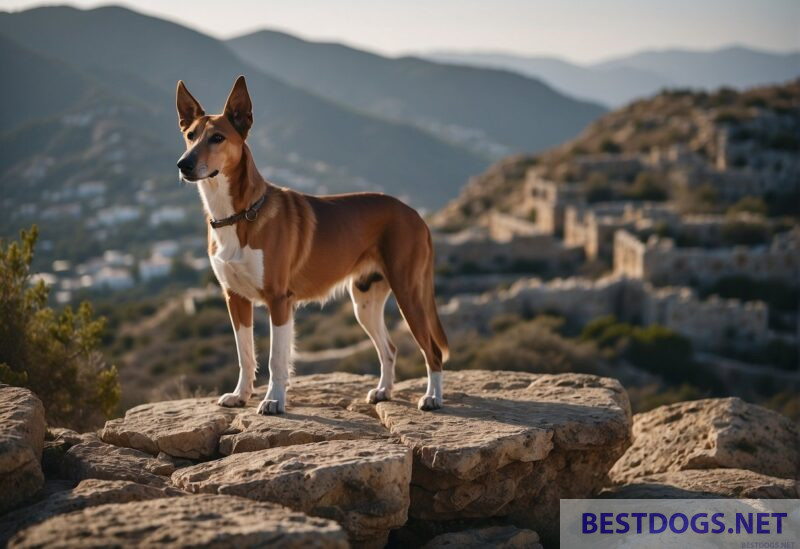
Cretan Hound: The heritage of the ancient Greek hunting dog breed
Table of Contents
The Cretan Hound is an exceptional breed that has stood the test of time, with roots that plunge deep into history.
Originating from the island of Crete in Greece, it is recognized not only for its antiquity but also for its versatile hunting skills.
Esteemed as one of Europe’s oldest hunting breeds, the Cretan Hound boasts a unique constitution well-suited to the rough, mountainous terrains of its homeland.
This breed is characterized by a lean, athletic form, which facilitates its agility and speed.
Physical attributes such as a long, wedge-shaped head and pricked, responsive ears contribute to its hunting prowess.
The breed exemplifies a balance between traits typical of scenthounds and sighthounds, with a keen nose for tracking and keen eyesight for spotting game.
As a testament to their adaptability and endearing qualities, Cretan Hounds have also found roles beyond hunting—they serve as loyal companions and effective guard dogs.
Their rare and pure lineage continues to intrigue canine enthusiasts who seek out this breed for both its historical significance and its multifaceted capabilities.
Origin and History
The Cretan Hound has a deeply rooted lineage that points to ancient times, with a specific development track on the island of Crete.
Ancient Lineage
The Cretan Hound is recognized as one of Europe’s oldest hunting breeds. Its existence dates back to ancient times, stemming from a genetic pool that has remained relatively unchanged.
The Cretan Hound is believed to have descended from ancient hunting dogs that were brought to Crete by early settlers. They have been used for hunting purposes on the island for centuries and are highly valued for their tracking abilities and agility.
Experts believe these dogs already had a significant presence on Crete when the Bronze Age civilization of Minoans flourished, suggesting the breed may be over 3,500 years old.
Development in Crete
In Crete, the breed was perfected for its utility in hunting over rugged terrain.
The Cretan Hound adapted to the local landscape, developing traits like agile reflexes and the ability to move swiftly across the rocky, uneven ground.
This selective breeding process, carried out by the inhabitants of Crete over millennia, solidified the breed’s physical and temperamental characteristics, making it a specialized hunter respected for its nose, speed, and intelligence.
Breed Characteristics
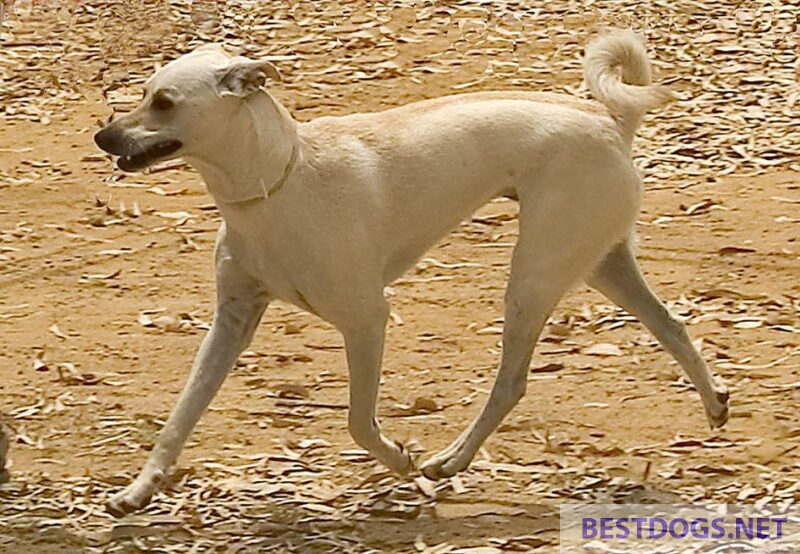
The Cretan Hound, with its long history and unique traits, presents a fascinating combination of physical prowess and adaptable temperament, complemented by a robust constitution that contributes to its longevity.
Physical Appearance
The Cretan Hound has a slender yet muscular build, reflecting its efficacy as a hunter.
Their coat, often in hues of sandy, white, or brindle, is short to medium in length and smooth to the touch, facilitating camouflage and mobility in their natural environment.
They are distinguished by their lean legs, deep chest, and long, curved tail, which is said to move in circular motion when they sense prey.
Typically, adult Cretan Hounds stand between 20 to 27 inches (50 to 68 cm) at the shoulder and weigh between 45 to 65 pounds (20 to 30 kg)
Temperament
These hounds exhibit a duality in temperament: they are intense and focused when on the hunt, yet gentle and calm at home.
Trained both for sight and scent tracking, the Cretan Hound demonstrates exceptional intelligence and an ability to work independently, making them reliable for hunters over centuries.
While the Cretan Hound is generally friendly and affectionate towards its family, it can be reserved and aloof with strangers. Early socialization and proper training are essential to ensure that the dog develops into a well-rounded and well-behaved companion.
This breed has a strong prey drive and may not be suitable for households with small pets such as cats or rabbits. However, with proper training and supervision, the Cretan Hound can coexist peacefully with other dogs and animals.
Health and Lifespan
Typically, the breed is known for good health, thanks to centuries of natural selection.
They possess a life expectancy of approximately 12 years or more, contingent on proper care and regular veterinary check-ups.
Their robust nature owes to a life of adapted terrain navigation and a history of survival amidst the rural landscapes of Crete.
Training and Care
Cretan Hounds are intelligent and respond well to consistent training.
While intelligent, Cretan Hounds can have a stubborn streak, which may make training a challenge for inexperienced owners.
Their exercise needs are considerable, owing to their hunting heritage, and they require regular grooming to maintain their coat’s condition.
Training Requirements
Cretan Hounds possess both keen sight and smell, making them versatile hunters.
Training should leverage their natural abilities by incorporating activities that stimulate these senses.
They excel with positive reinforcement techniques, especially when including rewards that make the process enjoyable for the dog.
To establish good behavior, start training early, with a focus on socialization, obedience, and consistency.
- Socialization: Expose them to various environments, people, and other animals.
- Obedience: Basic commands like sit, stay, come.
- Consistency: Regular training sessions, with clear and consistent instructions.

Exercise Needs
Due to their background, Cretan Hounds require ample exercise.
They thrive on daily activities that suit their stamina and speed. A mix of physical and mental exercise keeps them balanced and content.
The Cretan Hound does require regular exercise and mental stimulation to prevent boredom and destructive behavior.
- Physical Exercise:
- Daily walks or runs
- Agility courses
- Mental Exercise:
- Scent work games
- Interactive toys
Grooming and Maintenance
Cretan Hounds have a short coat that is relatively low maintenance.
However, they do shed, and regular grooming is vital to remove loose hair and maintain skin health.
- Brushing: Weekly using a firm-bristled brush.
- Bathing: As needed, but not too frequently to avoid drying out the skin.
- Nail Clipping: Monthly to prevent discomfort or injury.
Incorporate teeth cleaning and ear checks into the grooming routine to ensure overall health.
Hunting Skills
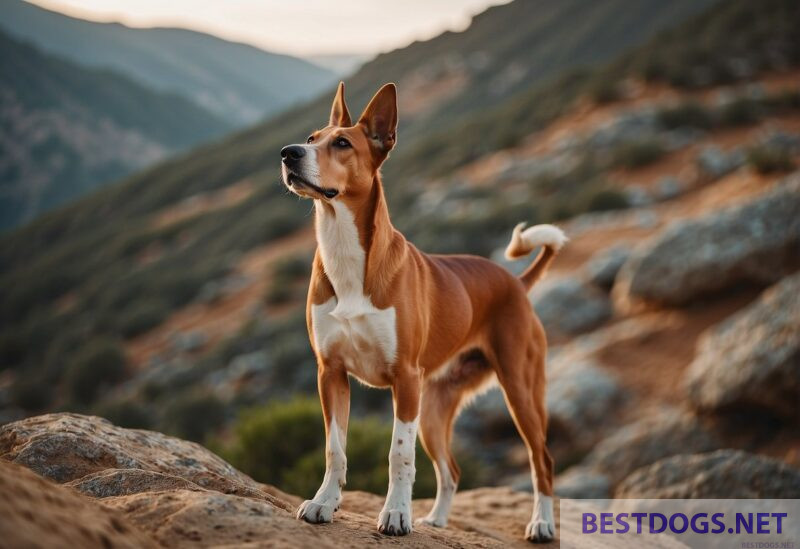
The Cretan Hound excels in hunting, defined by its acute scenting ability and coursing talent. These dogs are highly regarded for their proficiency in tracking and pursuing game across varied terrains.
Scenting Ability
The scenting ability of the Cretan Hound is a cornerstone of its hunting excellence.
With a nose that can pick up the faintest of trails, the breed is particularly adept at locating small game such as rabbits through the rugged landscapes of Crete.
Their olfactory acuteness allows them to excel in environments where other breeds might struggle.
Coursing Talent
In terms of coursing talent, Cretan Hounds are unmatched in their agility and speed.
They use these physical capabilities to chase and outmaneuver prey with finesse. The breed’s lean build and endurance contribute to its reputation as an efficient and effective hunter in open landscapes.
Cretan Hound in Culture
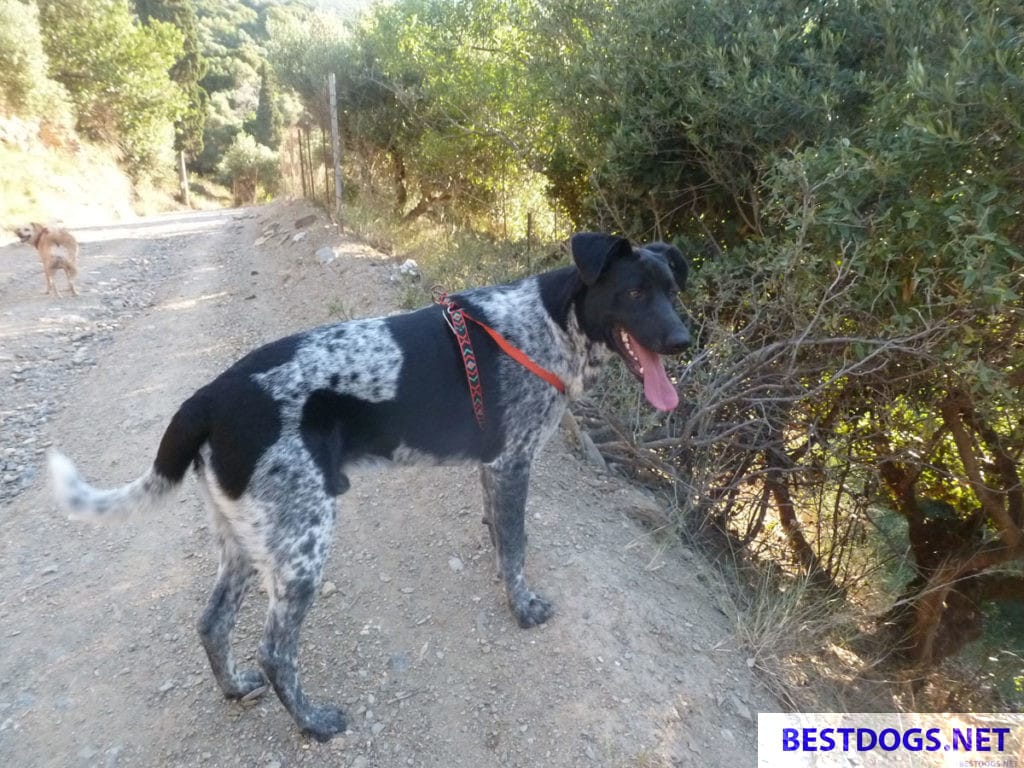
The Cretan Hound’s influence extends beyond its hunting capabilities, becoming an emblem in art and an integral element of Cretan culture and folklore.
Representation in Art
Cretan Hounds have been depicted in various forms of art throughout history, signaling their significance.
They are often portrayed in sculptures, frescoes, and coins, dating back to Minoan times. One striking instance is their appearance in the ancient artifacts of Crete, suggesting an esteemed status within society.
Cretan Culture and Folklore
In Crete, the Cretan Hound is not merely a dog breed; it’s a symbol of Cretan identity and resilience.
These dogs have been celebrated in local traditions and stories, esteemed for their intelligence and hunting prowess.
They are commemorated in legend as companions to the Cretan resistance during World War II, aiding fighters with messages and reconnaissance, a testament to their enduring legacy on the island.
Current Status
The Cretan Hound is a breed with a rich heritage yet faces challenges in population and widespread recognition. This section explores its current population status and the conservation efforts in place.
Population and Distribution
The Cretan Hound is considered a rare breed, most commonly found in its homeland, the island of Crete.
Estimates suggest the breed numbers are under a thousand, with a population fewer than 600, mainly concentrated in Crete itself. Though renowned for its hunting skills, it has a relatively limited distribution outside its native region.
Conservation Efforts
Initiatives are being taken by local groups to preserve and promote the Cretan Hound.
The Cretan Hound Club is significantly involved, advocating for the breed and offering suggestions to legislators on pet laws that may affect the breed’s future.
Recognition efforts are ongoing, as illustrated by a Cretan Hound named “Peristeris” aiding in enhancing the breed’s international profile at the 2023 World Dog Show.
Breed Recognition and Clubs
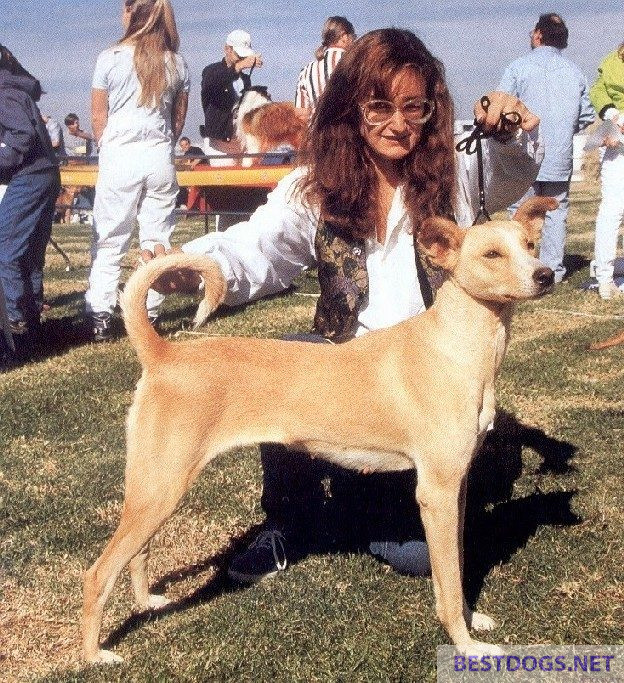
The Cretan Hound, also known as Kritikos Lagonikos, enjoys a rich history with origins traced back to Neolithic times. This breed is notably recognized within its homeland of Greece and has garnered international recognition as well.
In particular, Germany is mentioned among the countries that officially acknowledge the uniqueness of the breed.
In 2003, the Kennel Club of Greece officially recognized the Cretan Hound, a significant milestone for the breed’s proponents. The Greek club has taken steps to apply for recognition by the Fédération Cynologique Internationale (FCI), which would increase the breed’s international profile.
This process is critical as FCI recognition can assist in the preservation and promotion of the breed worldwide.
Furthermore, the breed is part of a conservation project for endangered breeds, demonstrating a committed effort to ensure the Cretan Hound’s survival and pure lineage. These efforts reflect a growing awareness and appreciation for the breed’s characteristics and historical significance.
Country |
Organization |
Recognition Status |
|---|---|---|
Greece |
Kennel Club of Greece |
Fully recognized |
Germany |
National Dog Organizations |
Recognized |
Global |
Fédération Cynologique Internationale (FCI) |
Pending Recognition |
The established breed standards help to maintain the Cretan Hound’s distinctive traits, such as size, coat color, and body structure. These standards are essential for breeders and enthusiasts who aim to uphold the integrity and heritage of the breed.
Frequently Asked Questions
When considering the acquisition of a Cretan Hound, prospective owners often have several inquiries related to the breed’s cost, lifespan, hunting capabilities, and other traits. The following FAQs provide clarity on these common questions.
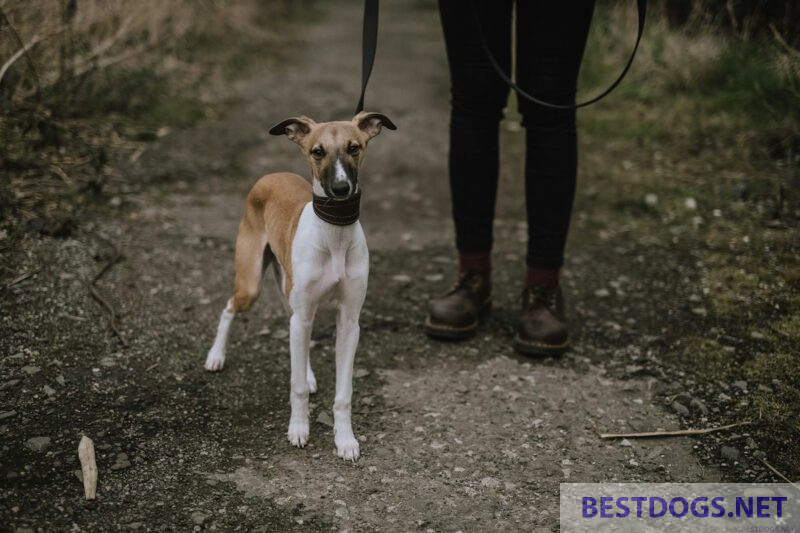
What is the typical price range for a Cretan Hound puppy?
The price for a Cretan Hound puppy can vary depending on the breeder’s location, the pedigree of the parents, and availability. Prices generally range from several hundred to a couple of thousand dollars.
How long is the average lifespan of a Cretan Hound?
A Cretan Hound can live on average between 12 and 15 years, with proper care and a healthy lifestyle contributing to their longevity.
What types of game are Cretan Hounds historically known to hunt?
Historically, Cretan Hounds have been used to hunt a variety of game, including hare and other small to medium-sized game, thanks to their strong sense of smell and superb sight.
What characteristics distinguish the Cretan Hound from other Greek dog breeds?
The Cretan Hound is distinguished by its exceptional tracking abilities and speed. This breed also has a slender build and a longer body compared to its height, making it unique among Greek dog breeds.
What should potential owners consider before purchasing a Cretan Hound?
Prospective owners should consider the Cretan Hound’s need for regular exercise, its independent nature, and its strong hunting instincts to determine if this breed fits their lifestyle and environment.
How does the Cretan Hound compare in temperament to other sighthound breeds?
The Cretan Hound tends to be more reserved and cautious around strangers compared to other sighthounds. However, they are also known for their loyalty and affectionate nature with their family.


